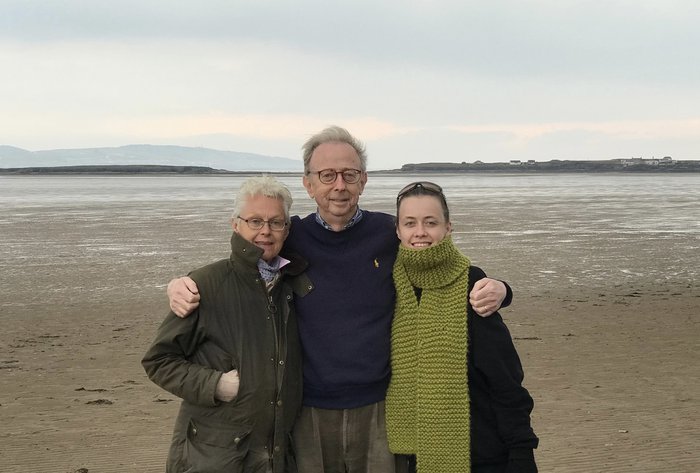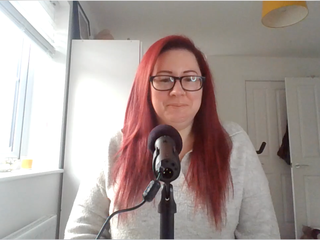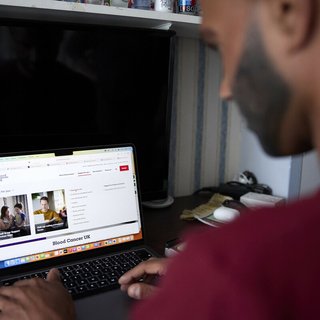Celebrating the little wins
In 2020, Jasmine’s dad had two autologous stem cell transplants (using his own healthy cells) as treatment for myeloma. Jasmine talks about her role in supporting him through his treatment.

In October 2019, my dad told me he’d been diagnosed with myeloma. Previously, in 2014, he had been diagnosed with MGUS after abnormal blood results were detected in a routine medical assessment. He started treatment almost immediately after his myeloma diagnosis, beginning with six months of chemotherapy ahead of two autologous stem cell transplants in May and September 2020.
My family were very open with me and encouraged me to ask any questions I had about Dad’s myeloma or treatment. I did ask a lot of questions, but I’m sure I could have asked more – it’s hard to know what you’d like to understand at the time!
Looking back, I wish I’d known more about what the treatment would be like so I could have understood more about what was going to happen.
Finding a role
I was 22 at the time and still living at home. At first, I wasn’t sure what my role would be. My mum provided the closest support for my dad. She often attended his appointments (virtually), so she was the person with the most detailed information about what was going on. My sister lives in Australia and with the pandemic in full flow, she unfortunately couldn’t be with us in person.
I’ve always had quite a light-hearted relationship with my dad and so that’s the role I slotted into – providing a bit of light relief at a difficult time.
I would always try to celebrate the little wins with him – his neutrophil count going up, the wounds in his mouth caused by the treatment beginning to heal, eating two spoonfuls of rice instead of one, being able to drink again after treatment.
Preparing for hospital
Dad didn’t want to take much into hospital for the stem cell transplants, but we tried to think of things that would keep him occupied. We sorted out online jigsaws, audiobooks, music playlists and a list of good TV programmes. We have a night-time trail camera at home, and we would send any hedgehog videos for him to see (there weren’t many)! We also put pictures on the wall at home and worked on the garden so that when he returned after treatment, he would have a nice surprise.
He couldn’t have his exercise bike in hospital, but they managed to find a seated pedal machine which he could use from his hospital chair. I think he felt exercise is always a good thing and if he could do just 10 minutes pedalling a day he’d feel better. Out of all of this, the thing he used most was definitely the pedal machine (and the audiobooks which he listened to while exercising, otherwise he would fall asleep)!
Preparing these things occupied my mind and made me feel useful. And it helped my sister to be involved even though she was far away.
Our preparations for the hospital stay helped Dad feel he was being cared for, even though we couldn’t be with him in person.
Keeping in contact
The first time he had a stem cell transplant, Dad wasn’t allowed any visitors at all because of the pandemic. Luckily, his room had a window overlooking the car park and I would drive up to the hospital with my mum, wave and have a chat if he felt up to it. Dad was always determined to get up before breakfast, shower, put on normal clothes, and eat something (however little) every day even if he didn’t have much energy. On days when he had less energy, I would look out for his waving hand poking through the curtains as he sat on the chair below the window.
We would message most days too – even if it was just good morning and good night. When I messaged, I would try to make it clear that he didn’t have to reply, but at least he knew I was thinking of him.
Supporting Dad’s eating
We were able to take food into the hospital so Dad could eat what he wanted, but it was a struggle for him at times because of the side effects of the treatment. It seemed that he had only just worked through one meal when the next one came in!
We often ate together as a family on Facetime. I think that having other people there, even if they weren’t physically in the room, was a helpful distraction.
When he came home, he started off with small portions and I learned to ask if there was anything on our plates that might make him feel unwell.
I once made the rookie error of piling Eton mess onto my plate while I was sitting next to him. The sight of all that cream was the last thing he needed!
How life has changed
I’m mindful that though Dad is in remission he’s taking maintenance treatment every day. I was quite naïve at first, expecting that once he was in remission it would feel like normal life for him again. However, this has not always been the case. He was out of action for numerous months with infections and various other complications along the way.
The pandemic has been an additional hurdle to manage. We have been doing our best to help him avoid contracting covid while supporting him to weigh up the risks so he can continue doing the things he enjoys.
When it’s something I can control like isolating before I visit so he doesn’t pick up any bugs, then I do it. When it’s something he really wants to do, we don’t give him a hard time!
We have more information about myeloma and other types of blood cancer. Visit our page about looking after yourself when you’re supporting someone with blood cancer.

Blood Cancer Heart to Heart podcast for family and friends
"I thought this is it. I’ve driven here as your girlfriend, and I've left as a doctor, a pharmacist, a nurse, a carer - everything all rolled into one."

